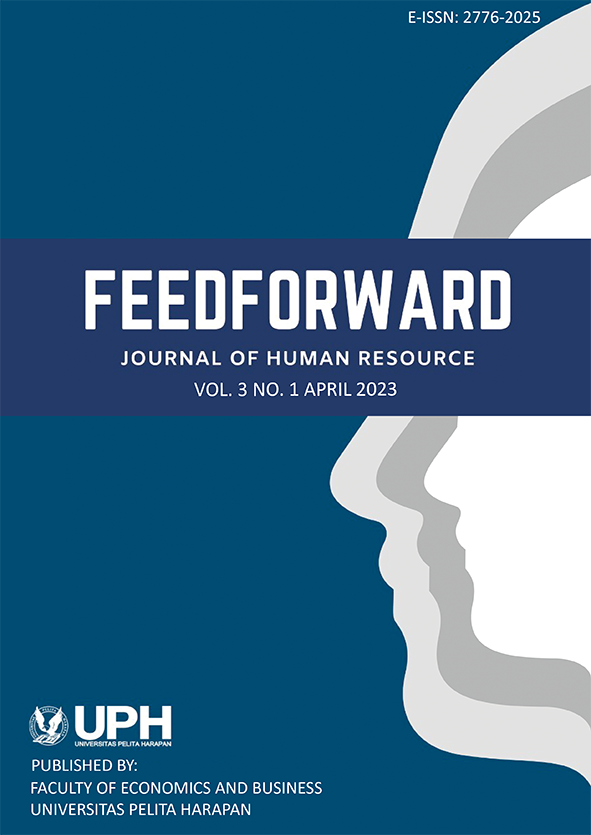Keadilan Organisasional, Trust, dan Komitmen Organisasional Berpengaruh Terhadap Organizational Citizenship Behavior pada Karyawan PT Boga Inti [Organizational Justice, Trust and Organizational Commitment Affecting Organizational Citizenship Behavior of Employees of PT Boga Inti]
DOI:
https://doi.org/10.19166/ff.v3i1.6776Trefwoorden:
Keadilan Organisasional, Trust, Komitmen Organisasional, Organizational Citizenship Behavior, Organizational Justice, Organizational CommitmentSamenvatting
Based on interviews with the Operational Director, Human Capital and Legal Director and Finance and Accounting Director, confirmation of several issues related to organizational citizenship behavior (OCB) was obtained. In conditions of limited manpower planning, everyone is required to work more than usual, whether it's within the scope of his own work, or also work in other units. Incomplete involvement and participation of all employees, especially for programs carried out by different departments. This causes the programs or policies implemented are not optimal. There is still a lack of employee involvement and participation, especially programs related to different divisions. This study uses multiple linear regression. Involvement of organizational commitment, organizational justice and trust as factors that influence the OCB. The results show that the three factors above play an important role in realizing OCB which will have positive benefits for achieving the company's vision and mission.
Bahasa Indonesia Abstrak: Berdasarkan wawancara dengan Operational Director, Human Capital and Legal Director dan Finance and Accounting Director, didapatkan konfirmasi beberapa issue yang berkaitan dengan organizational citizenship behavior (OCB) ini. Dalam kondisi manpower planning yang terbatas, setiap orang diperlukan untuk bekerja lebih dari biasanya, apakah itu di dalam cakupan pekerjaan dia sendiri, atau juga pekerjaan di unit lain. Keterlibatan dan partisipasi seluruh karyawan yang tidak sepenuhnya, terutama untuk program yang dilakukan oleh departemen berbeda. Hal ini menyebabkan program atau kebijakan yang dilakukan tidak maksimal. Keterlibatan dan partisipasi karyawan masih kurang, terutama program yang berkenaan dengan divisi yang berbeda. Penelitian ini menggunakan multiple linear regression, dengan rumus Slovin. Keterlibatan komitmen organisasi, keadilan organisasi dan trust sebagai faktor yang memengaruhi OCB tersebut. Hasilnya terlihat bahwa ketiga faktor di atas memegang peranan penting dalam terwujudnya OCB yang akan bermanfaat positif bagi tercapainya visi dan misi perusahaan.
Referenties
Dwika, I. A. P., & Adnyani, I. G. A. D. (2020). Keadilan organisasional, trust, dan komitmen organisasional berpengaruh terhadap organizational citizenship behavior pada karyawan. E-Jurnal Manajemen, 9(6), 2207-2226. https://doi.org/10.24843/EJMUNUD.2020.v09.i06.p08
Farida, S. I., Iqbal, M., & Kurniasih, A. (2016). Pengaruh kepercayaan dan komitmen organisasi terhadap motivasi dan kepuasan kerja. Jurnal Kependidikan, 46(1), 121-134. https://journal.uny.ac.id/index.php/jk/article/view/9576
Fitriastuti, T. (2013). Pengaruh kecerdasan emosional, komitmen organisasional dan organizational citizenship behavior terhadap kinerja karyawan. Jurnal Dinamika Manajemen, 4(2), 103-114. https://journal.unnes.ac.id/nju/index.php/jdm/article/view/2753/2813
Gautam, T., van Dick, R., Wagner, U., Upadhyay, N., & Davis, A. J. (2004). Organizational citizenship behavior and organization commitment in Nepal. Asian Journal of Social Psychology, 8(3), 336-345. http://dx.doi.org/10.1111/j.1467-839X.2005.00172.x
Lakshmi, P. A. V., & Simarmata, N. (2015). Hubungan antara iklim organisasi dengan perilaku kewargaan organisasi pada karyawan di perusahaan ritel. Jurnal Psikologi Udayana, 2(1), 25-37. https://doi.org/10.24843/JPU.2015.v02.i01.p03
Langton, N., & Robbins, S. P. (2011). Fundamentals of organizational behavior, third Canadian Edition. Pearson Education Canada.
Najafi, S., Noruzy, A., Azar, H. K., Nazari-Shirkouhi, S., & Dalvand, M. R. (2011). Investigating the relationship between organizational justice, psychological empowerment, job satisfaction, organizational commitment and organizational citizenship behavior: An empirical model. African Journal of Business Management, 5(13), 5241-5248.
Putra, P. D. P., & Sriathi, A. A. A. (2017). Pengaruh perceived organizational support dan komitmen organisasi terhadap organizational citizenship behavior. E-Jurnal Manajemen Unud, 6(9), 4800-4828. https://ojs.unud.ac.id/index.php/Manajemen/article/view/31519
Sekaran, U. and Bougie, R. (2016) Research methods for business: A skill-building approach (7th ed.). Wiley.
Sena, T. F. (2011). Variabel antiseden organizational citizenship behaviour (OCB). Jurnal Dinamika Manajemen, 2(1), 70-77. https://journal.unnes.ac.id/nju/index.php/jdm/article/view/2489
Suardani, N. M. D., & Supartha, I. W. G. (2018). Pengaruh pemberdayaan, kepemimpinan transformasional dan keadilan organisasional terhadap komitmen organisasional karyawan. E-jurnal manajemen, 7(3), 1426-1451. https://ojs.unud.ac.id/index.php/Manajemen/article/view/36587
Taurisa, C. M., & Ratnawati, I. (2012). Analisis pengaruh budaya organisasi dan kepuasan kerja terhadap komitmen organisasional dalam meningkatkan kinerja karyawan (Studi pada PT. Sido Muncul Kaligawe Semarang). Jurnal Bisnis dan Ekonomi (JBE), 19(2), 170 - 187.
##submission.downloads##
Gepubliceerd
Nummer
Sectie
Licentie
Authors who publish with this journal agree to the following terms:
1) Authors retain copyright and grant the journal right of first publication with the work simultaneously licensed under a Creative Commons Attribution License (CC-BY-SA 4.0) that allows others to share the work with an acknowledgement of the work's authorship and initial publication in this journal.
2) Authors are able to enter into separate, additional contractual arrangements for the non-exclusive distribution of the journal's published version of the work (e.g., post it to an institutional repository or publish it in a book), with an acknowledgement of its initial publication in this journal.
3) Authors are permitted and encouraged to post their work online (e.g., in institutional repositories or on their website). The final published PDF should be used and bibliographic details that credit the publication in this journal should be included.


